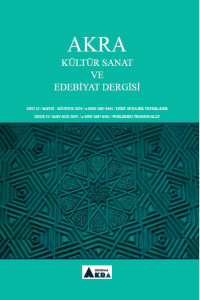Abstract
Yorumun bir sınırı ve ölçüsü olması gerektiğini savunan Umberto Eco, Yorum ve Aşırı Yorum isimli eserinde bir metne üç açıdan bakılarak yorumlama yapılabileceğine dikkat çeker. Bunlar; yazarın niyeti (intentio auctoris), okurun niyeti (intentio lectoris) ve metnin niyetidir (intentio operis). Bizce bu üç okuma biçimi arasında en geçerli olanı ise metnin niyetidir. Zira bir şiir şairinin elinden çıktıktan sonra artık yalnızca ne şaire ne de okura aittir. Artık o farklı yorumlamalara açıktır. Bu noktadan hareketle bu çalışmada, metin merkezli bir okuma yapılarak Ahmet Hamdi Tanpınar’ın Sesin isimli şiiri incelenmiştir. İnceleme esnasında şiir önce zaman ekseni doğrultusunda okunmuş yer yer de dizelerde geçen kelimelerin sözlük anlamlarına müracaat edilmiştir. İnceleme neticesinde şu sonuca ulaşılmıştır: Ahmet Hamdi Tanpınar’ın Sesin şiiri birinci tekil şahıs ağzından yazılmıştır. Şiirin ilk iki üçlüğünde anlatıcı bir hayâl âleminde yaşamaktadır, bir “rüyâ”da gibidir. Son iki dörtlükte ise özne, bu “rüya”dan uyanmış ve “dünya”da, gerçekte olmanın ızdırabını yaşamıştır. Şiirde öznenin kullandığı “ses” ise dünyaya, gerçeklere karşı bir çırpınıştır. Özne hülyadan uyandığı an bir hatıra bırakmak istemiş ve ölüme giderken ölümsüz olma aracı olarak “ses”i kullanmıştır.
Keywords
References
- Alvan, T. ve Alvan, M.H. (2016). Saz ve Söz Meclisi, Şule Yayınları, İstanbul.
- Ayvazoğlu, Beşir (2013). Eve Dönen Adam, Kapı Yayınları, İstanbul.
- Devellioğlu, F. (2015). Osmanlıca-Türkçe Ansiklopedik Lûgat, Aydın Kitabevi Yayınları, Ankara.
- Eco, U. (2012). Yorum ve Aşırı Yorum, Can Yayınları, İstanbul.
- Kaplan, M. (2013). Tanpınar’ın Şiir Dünyası, Dergâh Yayınları, İstanbul.
- Kaplan, M. (2019). Neşâtî Dîvân, T.C. Kültür ve Turizm Bakanlığı, Ankara.
- Suad El-Hakîm, (2004), İbnü’l Arab’î Sözlüğü, Kabalcı Yayınevi, İstanbul.
- Tanpınar, A.H. (2013). Yaşadığım Gibi, Dergâh Yayınları, İstanbul.
- Tanpınar, A.H. (2014). Bütün Şiirleri, Dergâh Yayınları, İstanbul.
- Yavuz, H. (2012) Okuma Biçimleri, Timaş Yayınları, İstanbul.
Abstract
Arguing that interpretation should have a limit and measure, Umberto Eco points out in his work Interpretation and Extreme Interpretation that a text can be interpreted from three perspectives. These; the author's intention (intentio auctoris), the reader's intention (intentio lectoris) and the text's intention (intentio operis). In our opinion, the most valid among these three reading styles is the intention of the text. Because once a poem leaves the poet's hand, it no longer belongs solely to the poet or the reader. Now it is open to different interpretations. Starting from this point, in this study, Ahmet Hamdi Tanpınar's poem titled Sesin was examined by making a text-centered reading. During the analysis, the poem was first read in line with the time axis, and sometimes the dictionary meanings of the words in the knees were consulted. As a result of the analysis, the following conclusion was reached: Ahmet Hamdi Tanpınar's poem 'Your Voice' was written in the first person. In the first two or three verses of the poem, the narrator lives in a dream world, it is like a 'dream'. In the last two quatrains, the subject woke up from this 'dream' and experienced the pain of being in reality in the 'world'. The 'voice' used by the subject in the poem is a struggle against the world and the facts. The subject wanted to leave a memory the moment he woke up from his dream and used 'voice' as a means of beco-ming immortal while going to death.
Keywords
References
- Alvan, T. ve Alvan, M.H. (2016). Saz ve Söz Meclisi, Şule Yayınları, İstanbul.
- Ayvazoğlu, Beşir (2013). Eve Dönen Adam, Kapı Yayınları, İstanbul.
- Devellioğlu, F. (2015). Osmanlıca-Türkçe Ansiklopedik Lûgat, Aydın Kitabevi Yayınları, Ankara.
- Eco, U. (2012). Yorum ve Aşırı Yorum, Can Yayınları, İstanbul.
- Kaplan, M. (2013). Tanpınar’ın Şiir Dünyası, Dergâh Yayınları, İstanbul.
- Kaplan, M. (2019). Neşâtî Dîvân, T.C. Kültür ve Turizm Bakanlığı, Ankara.
- Suad El-Hakîm, (2004), İbnü’l Arab’î Sözlüğü, Kabalcı Yayınevi, İstanbul.
- Tanpınar, A.H. (2013). Yaşadığım Gibi, Dergâh Yayınları, İstanbul.
- Tanpınar, A.H. (2014). Bütün Şiirleri, Dergâh Yayınları, İstanbul.
- Yavuz, H. (2012) Okuma Biçimleri, Timaş Yayınları, İstanbul.
Details
| Primary Language | Turkish |
|---|---|
| Subjects | Modern Turkish Literature in Turkiye Field |
| Journal Section | Review Articles |
| Authors | |
| Early Pub Date | May 18, 2024 |
| Publication Date | May 31, 2024 |
| Submission Date | January 23, 2024 |
| Acceptance Date | April 8, 2024 |
| Published in Issue | Year 2024 Volume: 12 Issue: 33 |


